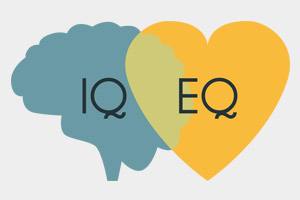

THERAPY
begin therapy
contact me
TOPICS
depression
anxiety/panic attacks
cope with flashbacks
anxiety & depression
anger management
blame-o-holics
addiction
dual diagnosis
grief & loss
grief suggestions
codependency 1
codependency 2
coda recovery
childhood trauma
on being a therapist
RESOURCES
Carl's Videos
Johari window
my child within
shame & guilt
fear of intimacy
reparent WC
shattered
serenity prayer
control/responsibility
empathy
taming the mind
mindfulness
stress management
spam of the mind
self-care
healthy conflict
assertiveness
healthy boundaries
meditation
mistaken beliefs
IQ vs. EQ
maturity/immaturity
happiness habits
Pollyanna thinking
basic human rights
helpful quotations
helpful books
helpful movies

Emotional Intelligence EQ vs. IQ:
Why Do Some Smart People Keep Making the Same Dumb Mistakes?
To answer this question, we need to understand the difference between Emotional Intelligence (EQ) and Intelligence Quotient (IQ).
I define
EQ as
“the ability to process painful
emotions in healthy and effective ways.”
Thus, high EQ means I have good
 skills in managing painful emotions.
Low EQ means I have poor skills in managing painful emotions.
skills in managing painful emotions.
Low EQ means I have poor skills in managing painful emotions.
For example, high EQ would allow me to deal with the emotions of losing a valued job in healthy and effective ways, such as by acknowledging my feelings, relying on my social supports, practicing self-care, empowering myself to apply for other jobs, and/or using other effective coping skills. Low EQ would cause me to deal with the pain of the same situation in ineffective, destructive, or self-destructive ways, such as by drinking, drugging, self-cutting, self-loathing, catastrophizing, hopelessness, denial, emotional eating, avoidance, or other maladaptive ways.
For our purposes, I define IQ as “the ability to learn and
use one’s thinking mind to skillfully solve problems.”
High IQ means I am skilled at solving problems through learning and
reasoning. Low IQ means I am not skilled at solving problems through
learning and reasoning. For example, high IQ might allow me to learn to
use a new computer program in an efficient manner while Low IQ would
make that task more difficult.
Thus, EQ is about one’s ability to process painful emotions, whereas IQ is about one’s ability to use learning and reasoning to solve problems. Now to answer the question, “Why do some smart people keep making the same dumb mistakes." Well, it's because their low EQ has turned their high IQ into a slave!
So, how does this happen? By definition low EQ means
that a person uses ineffective or unhealthy strategies for dealing with
emotional pain. But why would a
smart person keep using these strategies if they don’t work? Because
low EQ strategies, such as drinking, over-eating, denial, avoidance,
etc., often give some immediate relief from pain but in the long run actually increase pain, resulting in,
"Short term gain, but long time
pain!" For example, Jane discovers that drinking alcohol gives
immediate relief from her anxiety, but the use of alcohol to manage
chronic anxiety can eventually lead to addiction, which just adds
another problem to Jane's life..
actually increase pain, resulting in,
"Short term gain, but long time
pain!" For example, Jane discovers that drinking alcohol gives
immediate relief from her anxiety, but the use of alcohol to manage
chronic anxiety can eventually lead to addiction, which just adds
another problem to Jane's life..
So the rule of thumb is this: If the need for immediate relief from emotional pain is strong enough, then high IQ persons with low EQ skills will keep relying on ineffective low EQ strategies, despite long-term negative consequences, because the emotional need for immediate relief from pain hijacks their normally high IQ into rationalizing, minimizing, and denying that their way of "coping" is causing problems. In other words, the person's thinking mind (IQ) becomes slave to his or her emotional needs as low EQ overrides high IQ, which is why smart people can keep making the same dumb mistakes over and over.
Below is Carl's 6-minute YouTube video of this article:
Of
course, addiction is an obvious example of an emotional need over-riding
high IQ. After all, haven't we all known smart people who keep abusing
alcohol or drugs despite significant
negative consequences? So, let’s look at a more subtle example.
Bob
 had a difficult childhood.
His dad abandoned the family when he was six, and then his mother used
alcohol to cope and was often irritable, critical, and verbally abusive
to Bob. She shamed him terribly whenever he did something wrong, even
something minor. So Bob adapted to this sad environment by never
admitting to making a mistake, which became his strategy for avoiding
his mother’s wrath. Over time, it became subconscious and automatic,
continuing into adulthood. Of course, this strategy spared some
short-term pain, but in the long-rum, it created many problems. Whenever
he received poor grades, he blamed the teachers. Whenever he made
mistakes at work, he blamed his boss. Whenever he treated his wife
poorly, he blamed her. As a result, Bob never learned from his mistakes
because his emotional needs would not allow him to “own” them. Thus, he
never achieved his full potential in school, at work, or in his marriage
as a husband.
had a difficult childhood.
His dad abandoned the family when he was six, and then his mother used
alcohol to cope and was often irritable, critical, and verbally abusive
to Bob. She shamed him terribly whenever he did something wrong, even
something minor. So Bob adapted to this sad environment by never
admitting to making a mistake, which became his strategy for avoiding
his mother’s wrath. Over time, it became subconscious and automatic,
continuing into adulthood. Of course, this strategy spared some
short-term pain, but in the long-rum, it created many problems. Whenever
he received poor grades, he blamed the teachers. Whenever he made
mistakes at work, he blamed his boss. Whenever he treated his wife
poorly, he blamed her. As a result, Bob never learned from his mistakes
because his emotional needs would not allow him to “own” them. Thus, he
never achieved his full potential in school, at work, or in his marriage
as a husband.
Unhealed wounds from childhood often have low EQ ways of defending against feeling the pain of those wounds, which is precisely why they remain unhealed. Instead of working through the pain in healthy ways, we use primitive “defenses” to try to wall off the pain, which usually involves enlisting our normally intelligent mind to distort reality through denial, rationalization, blame, minimization, or other defense mechanisms of the mind.
So, if you are a person who keeps making the same mistakes over and over, how do you fix this? The short answer is that you need to identify the strong emotional needs that have hijacked your high IQ and then learn new high EQ skills to replace the low EQ strategies so you can heal your emotional wounds, which will allow you to make better decisions for yourself and live a more fulfilling life.
Here are some examples of Low EQ Strategies: drinking, drugging, or any kind of addiction or compulsive behavior; recurring thought patterns of self-loathing, hopelessness, catastrophizing, or victimization; avoidance, denial, minimization, perfectionism, and procrastination; using anger as a shield to avoid dealing with unhealed wounds; using codependency as a distraction from dealing with unhealed wounds; obsessing on what you can’t control while ignoring what you can control; passive, aggressive, or passive aggressive communication skills; refusing to ask for help or listen to feedback from trusted others.
Here are some examples of High EQ Skills: focusing on what you can control; using mindfulness and relaxation skills; learning assertiveness and other effective communication skills; using self-nurturing and rational self-talk; being able to ask for help; listening to feedback from trusted others; owning mistakes without beating up on self; developing an “attitude of gratitude,” seeing the glass half-full, and other techniques that you allow to see a balanced picture of your life rather than just focusing on the negatives; learning anger management and stress management skills; obtaining counseling, attending support groups, journaling, and talking about your issues so as not to repress them; and taking medications when appropriate.
In summary, in order to avoid making the same dumb mistakes over and over, you must learn to identify the strong emotional needs and low EQ strategies that perpetuate the mistakes and then replace them with high EQ skills that actually deal with the emotional pain in effective and healthy ways. Of course, to do this you must be able to break through the denial, blame, rationalization, and minimization that maintain the low EQ strategies, which can be difficult to do since these defense mechanisms create blind spots. Thus, if you feel stuck and would like help uncovering your blind spots and developing high EQ, then click on the photo below to apply for therapy.
To follow my posts on Facebook, please click the Like and/or Share buttons below:
Click on the photo below to request online therapy..

for a new beginning...
Home / My Credentials / Counseling Philosophy / Online Therapy Risks & Benefits / Services & Fees / Confidentiality / Begin Therapy / In Crisis Now? / Contact Me / Carl's YouTube Videos / Sitemap
Copyright 2005-2022 Serenity Online Therapy
All Text and many photos by Carl Benedict